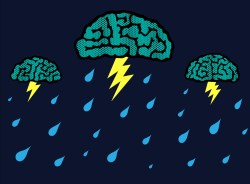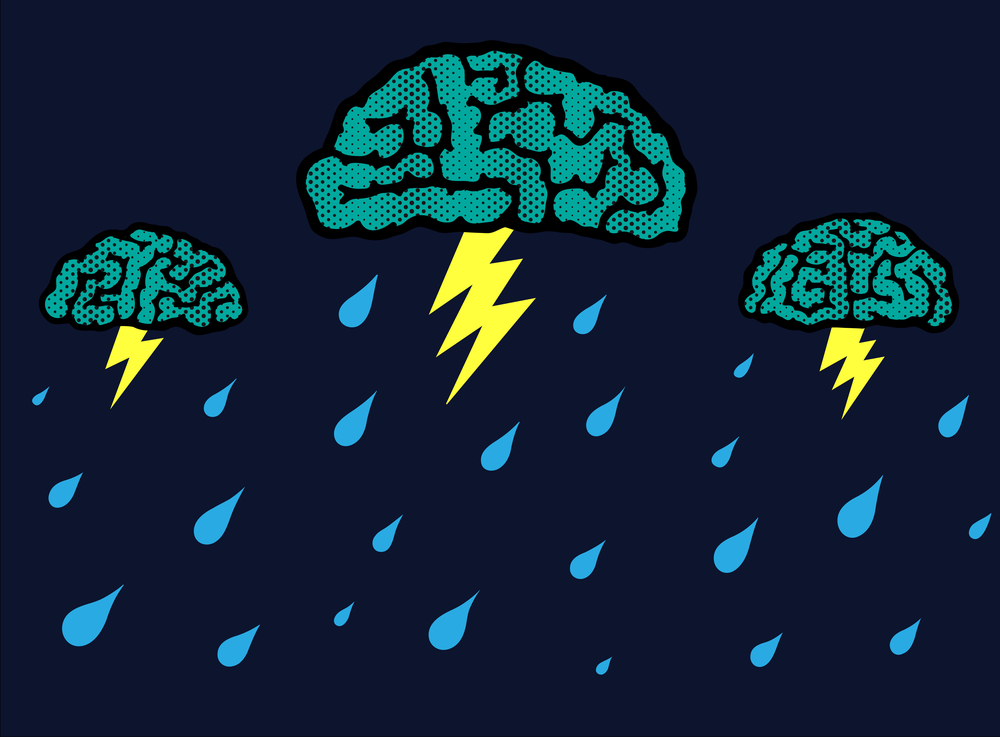
Shutterstock“Guys: Let’s brainstorm ways to change people’s minds on climate. What?”
The climate change discussion in the U.S. has always been preoccupied with “skeptics” or “deniers” or whatever they’re called now, the kind who frequent Marc Morano’s blog and post angry comments under Al Gore interviews. These folks are highly engaged on climate change and often, perversely, quite educated about it — they are motivated to learn about it in their efforts to debunk it.
I can not count how many discussions I’ve had, and witnessed, about how to debunk these people, or counter their lies, or convince them that they’re wrong, or counter their influence, or otherwise solve the problem they are supposed to represent.
I’ve long thought that this is a misallocation of energy, putting the most effort and thought toward those who are least likely to be budged. The implicit thinking always seems to be that if the deniers can be cracked, everyone else will follow in a grand cascade. But I think that’s badly wrong. The political problem for climate change is not a hard nut of dead-enders, but that great mushy middle that doesn’t have strong feelings about climate one way or another and doesn’t pay much attention to deniers or realists.
A new study in Nature Climate Change lends some credence to this perspective. It takes on a question that’s been on everyone’s mind recently: Do severe weather events and disasters enhance people’s level of belief in the reality of climate change?
The notion that they do (or will) is widely taken for granted — thus the flurry of “this will change everything” buzz that followed Katrina, the BP oil spill, this summer’s drought, and now Sandy. Thus the refrain, heard often among campaigners, that the public won’t really wake to the danger of climate change until something truly catastrophic happens.
But there’s a school of folks skeptical about this idea as well, for reasons articulated by communication expert George Marshall over on Dot Earth. The main effect of disasters, they say, is simply to reinforce whatever socially constructed attitudes predate the disaster. Whatever people feel or believe about climate change beforehand, they’ll feel or think even more so afterwards. (Social psychologists call this “motivated reasoning” — seeking out evidence that confirms existing beliefs; ignoring evidence that contradicts them.)
The authors of the Nature study set out specifically to answer this question:
Do observable climate impacts create opportunities for people to become more certain of the reality of global warming, or does prior belief certainty shape people’s perceptions of impacts through a process of motivated reasoning?
(Side note: So many of the battles over climate communication come down to competing hunches and intuitions. It’s nice to see real research being done. I hope there’s lots more to come!)
So which is it? Long story short: Both processes occur, but they are not evenly distributed. Here’s the conclusion:
[W]e find that people who have low engagement in the issue of global warming (approximately 75% of the population) are more likely to be influenced by their perceived personal experience of global warming than by their prior beliefs, whereas those Americans who are highly engaged in the issue (on both sides of the issue) are more likely to interpret their perceived personal experience in a manner that strengthens their pre-existing beliefs (that is, using motivated reasoning).
In other words, people who have made up their mind … have made up their mind. One more storm won’t change it. But among people in the mushy middle, who don’t have strong thoughts one way or the other, personal experience can make a real difference. And the mushy middle is much larger than the class of committed deniers!
So what does this mean for communication strategy? Let’s hear from the researchers:
These findings suggest that place-based climate change education strategies — which highlight the local impacts of climate change in a manner that can be experienced by people with their senses — hold considerable potential to help large numbers of Americans come to understand the issue in a manner more consistent with the state-of-the-science. Such strategies might include TV weathercasters using extreme weather events as an opportunity to educate their viewers about the increasing frequency and/or intensity of such events, park interpreters and agricultural extension agents describing evidence of climate change impacts in situ, and public health professionals drawing attention to the local health impacts of climate change in a given community. Selecting highly trusted sources as educators for experiential learning strategies is key, as some messages have the potential to backfire among those segments of the public actively engaged in countering climate science. As the directly observable and experienced local impacts of global climate change continue to increase, these ‘teachable moments’ will become more common, and more dramatic.
Such focusing events can make the invisible processes of climate change visible, and render the abstract concrete, but these events do not explain themselves. Turning observable local impacts into experiential learning opportunities often requires that trusted communicators — who have access to large cross-sections of the public — provide scientifically accurate interpretations that connect the dots from changes in local weather patterns, environmental conditions, and extreme weather events to climate change.
This seems about right. If I could boil it down:
- Focus on the mushy middle; committed deniers are largely beyond reach.
- Be opportunistic — make the most of those times when climate chaos makes itself known at a visceral level.
- Find trusted communicators.
This third one is so key and it’s a huge problem on climate. God bless Al Gore and Bill McKibben and those guys, but they are reaching a fairly circumscribed slice of culture. Storms and the like can unsettle people, leave them open to new or revised information, but even then they will look, not to scientists or activists, but to more familiar, proximate sources of authority and trust. The question on their mind is, “What are people like me supposed to think about things like this?” That’s not a scientific question; it’s not about evidence or argument. It’s about social and tribal connections.
The climate communication effort must prioritize seeding local communities with those kinds of communicators. No amount of evidence, no clever slogan or term, can substitute for trust. Don’t listen to the scolds — the mushy middle can be moved by severe weather and the like — but not just anyone can move them.



